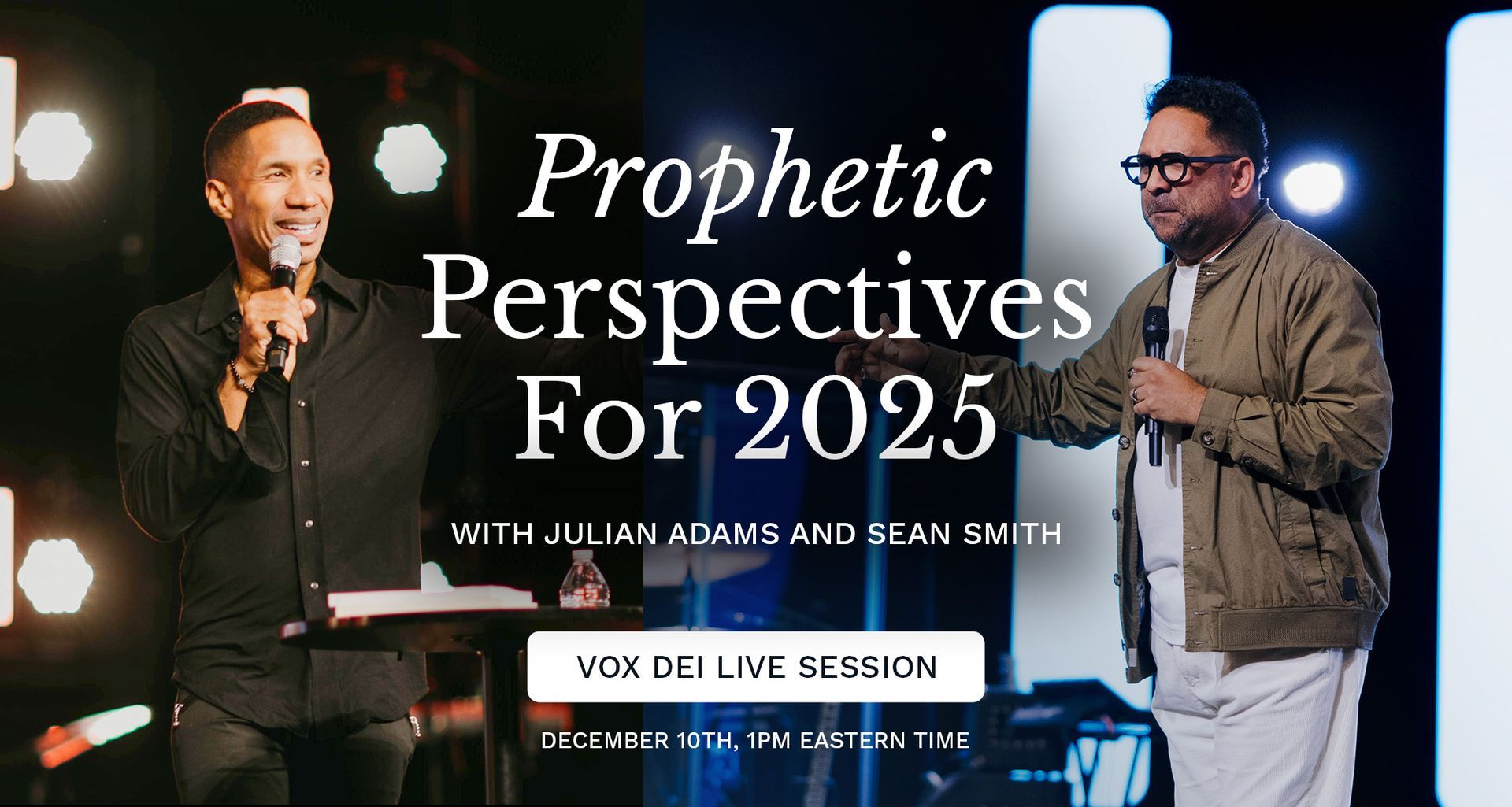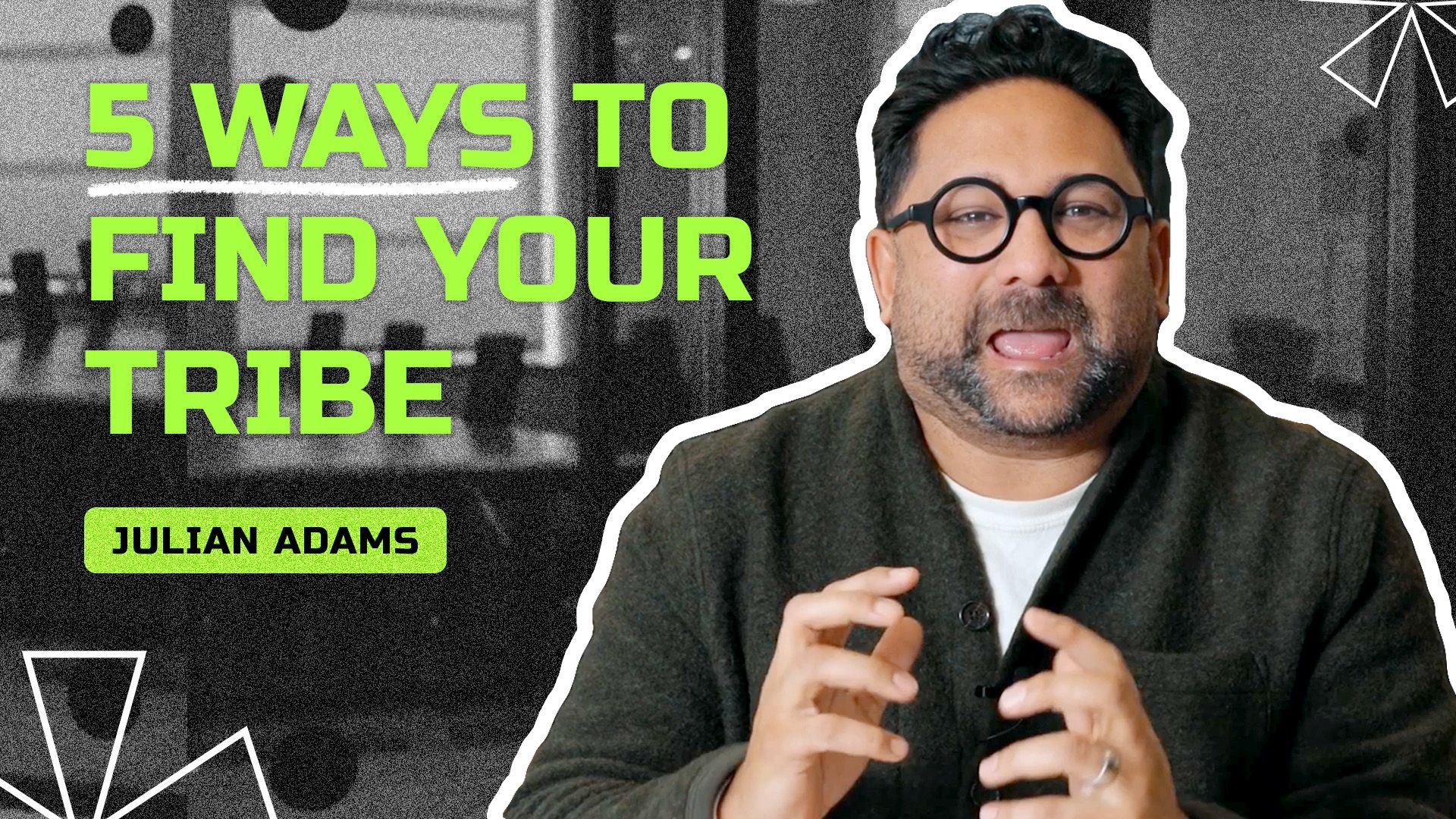Seriously, though, we must remember the prophetic, the goal of the prophetic, is not how accurate you are. The goal of the prophetic is revealing the love of God, and there’s something beautiful about that. You should be in the gospel of John, chapter 7. I did say that, right? If you can’t find it, give up. John, chapter 7, verse 37. “On the last day of the feast, the great day, Jesus stood up and cried out, “If anyone thirsts, let him come to me and drink. Whoever believes in me, as the Scripture has said, ‘Out of his heart will flow rivers of living water.’” Now this he said about the Spirit, whom those who believed in him were to receive, for as yet the Spirit had not been given, because Jesus was not yet glorified.”
I love Pentecost Sunday. Like I said, I loved growing up in the context of experiencing the Holy Spirit. My personal experience of the Holy Spirit began at the end of my third year where, on my mum and dad’s bed, they prayed for me and I was filled with the Holy Spirit. Some of you might not be used to this, but I began to speak in other languages, in other tongues. You might’ve heard that tonight as you were worshipping, people speaking in a foreign language. That is by the empowerment of the Holy Spirit, to help us worship Him, to help us engage with Him. And that’s what happened for me, so I don’t remember a day not speaking in tongues, I don’t remember a day not being connected to who He is, because He’s so kind. I’m so glad that God’s aim in our lives is not simply to leave us alone, but to fully inhabit us. To fully possess us with His Spirit. And I love this text because it’s an incredible moment in the gospel of John where Jesus is talking at a feast called the Feast of Tabernacles. There’s something profound happening here and I believe— and I’ll teach on this just in a moment, because I want to do some ministry time at the end of this— that there’s something that God wanted to break open our understanding around what it means to live in the person and the work of the Holy Spirit. A great theologian, R. A. Torrey, said this: if we understood the Holy Spirit less in terms of a force, we would stop asking for more of the Holy Spirit, and if we understood Him as a person, we would begin to say, “Holy Spirit, have more of me”.
There is something we need to understand. The Holy Spirit’s aim in our life is not simply to empower us in mission. The Holy Spirit’s aim in our life is to fill us with all the goodness of God. With the fullness of who He is, not just so that we get to do, but so that we get to be. In fact, when you do a study in the scriptures around the Holy Spirit, you’ll quickly understand, particularly in the new covenant, that the Holy Spirit has less to do with mission and more to do with Sonship. Understanding that identity. I love that Luke, the writer, talks about the prodigal son. You remember that story? It really should be called the ‘prodigal God’. The word ‘prodigal’ means lavish, and the only person in that story who is lavish is the Father. And there’s something beautiful that happens in this context. The Bible says that Luke, when he’s recording the speech of how the father ran towards the son, you remember that moment? When Peg’s smelly son is walking down the street and the son runs up to him, falls on him, and kisses him. It’s a beautiful moment there, where it literally means he kept on kissing.
Now, my dad has the privilege— my dad is the only man who has this privilege— when he sees me, he gets to kiss me on the lips, because it’s a sign that I’m his son. That’s what it means. And Luke, talking about the outpouring of the Holy Spirit in the book of Acts, says, “And the Holy Spirit fell on them.” He uses the exact same phrase that he’s used in Luke, chapter 15, speaking of how the father fell on the son and kissed him. Because the Holy Spirit is the kiss of the Father to us. And He keeps on kissing! Mwah! Mwah! Mwah! Mwah! And it’s uncomfortable, you know what I’m saying? When it just keeps on. Mwah! Mwah! The father was making a point in that moment— “I’m going to keep on kissing this son! This one who is dead, is now alive!” Because the Holy Spirit is more than just power to do; He is the person to help you understand who you really are. He’s the kiss of the Father.
And, you know, Jesus, in this context, is speaking about the outpouring of the Holy Spirit, and He’s doing so at the Feast of Tabernacles. Now, we need to understand some background. There were a number of feasts that had to be fulfilled and, if you were a good Jew, you would make sure that you would get to the temple for this feast. The first feast was the Feast of Passover. You guys, I’m sure you’re quite well Bible-versed. Passover represents our salvation. It’s the moment where we’re crossing either the land of bondage in Egypt, as it were, and into the promised land. It speaks of that moment where— it’s just a beautiful, beautiful moment where the blood is applied to the lintel posts over a door so that death passes over those who are covered by the blood. There’s something beautiful about that because it shows us what it’s like for us to understand, and to know, and to confidently experience the life of Jesus. That, because of His blood, because of His righteousness, as a free gift to us, we get to live in the security of knowing that death is not our portion, but life is. If that still doesn’t make you happy, I’m not quite sure what will.
I’m so glad that the Bible says that God, in Christ, was reconciling the world to Himself, not counting their sin against them! I always find it fascinating when I see churches counting the sin against people who are sinners, when the Bible says that God is not counting your sin against you. And when God’s doing the math on what it’s like for those in Christ, He’s saying, “You’re not guilty!” Sheeka-bazooka! And so, it’s moving out of favour into freedom. The second festival that they would have to have— actually, sorry, there were three festivals, not four. The second festival was the Festival of Pentecost, which is what we’re celebrating today. Pentecost spoke of the giving of the Holy Spirit, but actually it connects back to a moment on Mount Sinai when Moses received the law. Pentecost spoke of giving the law. I’m so glad that under the new covenant we don’t get rules and regulations, we get a person. The Bible says that the person of the Holy Spirit now tells us how we should live so we fulfil the law, not by our own strength, we fulfil the law not by our own doing, but by the empowerment of the Spirit. It’s what the prophet Ezekiel saw hundreds of years into the future, saying he will give them a new heart and the law of God will be written on their hearts.
You see, there is no rule or regulation in the Bible that I have to obey because, by the power of the Holy Spirit, I want to obey, because I’ve got a new nature! Let me just stay here for a moment. Do you know that when you became a Christian, your old nature died? The one that is predisposed to sin. The one that is predisposed to wrong-doing. The Bible says that that was crucified with Christ on the cross; you were co-crucified with Him. And if you were co-crucified with Him, you have been co-resurrected with Him, so that the same Spirit that raised Jesus from the dead now quickens your mortal bodies. I’m going to preach myself happy even if you’re not going to get happy. I told you! I told you I was a little bit Pentecostal! And it’s Pentecost Sunday. And there’s something beautiful about this, when you begin to understand that my nature is not predisposed to sin when I become a Christian. I get a brand-new nature! The old is gone. You know, the Bible says that necromancy is a sin. That means speaking to dead people. And what the church often does is we keep digging up our old nature, that thing that is dead and buried. We keep looking at it. The thing is, what you behold, you become like. I wonder if the issue of sin in the church has less to do with us preaching harder and telling people what to do, and more to do with changing the focus so that we’re looking at Jesus, who is the full manifestation of our new nature right now. You see, I do not overcome sin by doing a ‘just say no’ campaign. I overcome sin by beholding something more pleasurable and more beautiful.
And so, Pentecost: instead of getting the law in the new covenant, we get the Holy Spirit. Not only that, Pentecost is what was called the ‘first fruits’ celebration. Ten percent, a down payment of the first fruit that was beginning to spring up in harvest time; it was a symbol of the harvest that would fully come in. In the UK, where I’ve lived for a long time, we’d have what was called ‘spring lamb’. It’s something that we eat, forgive me if you’re vegan, I’m really sorry. I don’t know if that’s politically correct, but hey-ho, here we go. The first batch of lambs were called spring lambs, because they were the most tender, praise the Lord. Forgive me, again. I’m sorry, I’m South African, I can’t help it... It was a symbol of the first fruit. It was kind of like harvesting; we would go and harvest the first fruit and bring it to the temple, as a sign of the great harvest that was to come. Pentecost is one of those moments. Pentecost, for the church, was the moment of visitation. I wonder when last we’ve had an explanation of what happens in our meetings. You know, the first church meeting that happened, there were people looking drunk, extremely happy, and it was only 9 o’clock in the morning. Gosh, how far we’ve come in our understanding of church that 9 o’clock in the morning, what we do not see are drunk-looking, happy people in church meetings. I will move on quickly, because that’s not true of this church.
With Pentecost, there’s this moment where the Holy Spirit visited in an unusual way, and we see that the result is that three thousand people get added. I wonder, if we want to see biblical results, we should probably do it the Bible way. I just want to say this, just for a little moment, is that this church meeting was never meant to be tailored to your needs. I wonder if we should stop saying ‘church service’ and rather say ‘church meeting’, because the only one that we need to serve is Him! You’re not coming to a service; you don’t pull in with your car and get it serviced and off you go. We’re coming for a meeting with the King of Kings, and the result is that those who are not yet Christian and those who are Christian are built up to encounter the goodness of God. Pentecost is this moment of visitation, and we get the ten percent down payment. We get to see something of the Kingdom of God, but how many of you know that it was simply first fruits? There was more to come. And when Jesus is talking about the outpouring of the Holy Spirit, He’s not doing so in the context of Pentecost, He’s doing so in the context of tabernacle. The Feast of Tabernacles. The Feast of Tabernacles was a picture of the full gathering, the full harvest moment. The Feast of Tabernacles spoke of the moment that the messiah would enter the temple and all things would begin to be made new.
I wonder if the church has settled at Pentecost, when Jesus was always intending that the culmination of the outpouring of the Holy Spirit would end in tabernacle: the full gathering, the full harvest. The thing is, that Jesus is telling the story in a particular context, in a particular moment. He’s doing so literally as the whole of the priests and Israel is at this feast outside the temple. Now, in Jewish understanding— it’s getting hot up here— in Jewish understanding, the temple was the place that heaven met earth. It’s the place where God’s purposes were finally connected and joined together again, just like it was in Eden. And how many of you know that, in Jewish understanding, heaven is not the place you go to when you die? Some of you are like, “really?” It’s not simply a post mortem reality. Yes, we do go there when we die, but heaven is a coexisting reality that we get to access right now. So, I’m not living to die to get to heaven, I’m living with heaven all around me. And for the first time since Eden, we see that Jesus is the place where heaven and earth meet. What would happen was the priest would take some water, and they would begin to pour water right down from the steps of the temple, and it would begin to rush down, symbolizing Ezekiel’s river. How many of you remember that? The further the river moved from the temple, the further the river moved from the sacred place, the stronger the flow and more fruitful the flow.
I want to suggest to you that it is time for us to move from the sacred place into the secular space, because the river of God works best the further away it flows from the temple. And so, Jesus says this profound thing. He says, “anyone who is thirsty”— so, you need to picture this. They are pouring out water, and they are seeing this. This is the very that Jesus is talking about as they’re pouring out the water of the Spirit. Fruitfulness, different kinds of fish, different kinds of fruit all over the place. And He says, as they’re doing that, in a loud voice to get the attention of everyone, He says, “If anyone is thirsty, let him come to me and drink.” What He was saying in that moment, He was saying, ‘You see this physical temple? It is obsolete. It no longer has power. Brick and mortar does not contain the presence of God. If you really want the river of God, you need to come and drink from me, because I am the touchpoint of heaven and earth.” That’s what Jesus was saying in that moment. And not only that. I mean, it is outrageous what He says next! He says, “If you come and drink from me”— He doesn’t simply say that you will be satisfied. He doesn’t simply say that you’ll get a little bit and you’ll be okay. He says this, He says, “If you come and drink from me, out of your belly will flow rivers of living water.” He was saying, “You see this temple? It is now met in me. I am now the touchpoint of heaven and earth, and not only that, when you drink from me, you become the touchpoint of heaven and earth wherever you go!” No longer is the sacred place in some position in Jerusalem, you know, thousands of kilometres away— or miles, you guys say miles. But now you have become the sacred place and wherever you go, there’s a river that’s supposed to flow.
Pentecost was just ten percent. Tabernacles is the full overflow of harvest. I want to suggest to you that the Kingdom of God dwells within you, not to be shut up like a dam, but it is meant to have a floodgate that opens like a river. Because the more you drink from Him, the more there’s an overflow. You see, for many of us, we live in our baptism of the Holy Spirit experience as a one-off event, when God has called us to make it a dwelling place that we are to live and move and have our being in Him. That we are consistently to be overflowing with the Holy Spirit because, suddenly, wherever you show up, in whatever secular space you find yourself, it suddenly becomes a sacred place where the river of God begins to flow. You see, the only thing that’s separate from God is sin, and even that He’s overcome through Jesus. It means that everywhere you go, that place becomes holy. There’s a river that’s meant to flow from you because you’re consistently drinking from Jesus. And you see, this word ‘tabernacle’ is a specific word that doesn’t just mean ‘to come and visit’. It means to move in and to make a habitation. Literally, when the Bible talks about Jesus’s tabernacle amongst us, it says that He moved into the neighbourhood and made His home amongst us. Many of us have settled for Pentecost when there’s a visitation, but God wants us to live in tabernacle where there’s a habitation. You see, it’s not okay just to wait, because when Jesus was talking about this, He was doing something in the context of tabernacles. He was saying that your experience of the Holy Spirit should not simply be waiting for Him to come upon you just in a moment. Your experience of the Holy Spirit should be that He now lives and dwells in you as a habitation. Jesus is inviting you to live in a habitation with the Holy Spirit. We need to move from simply waiting for Him to come down, to realize He already lives in us. Some of us are waiting for the leading of the Holy Spirit to bring change. Stop waiting, He’s already led you, because He’s filled you.
Katia and I, when we first started dating, we had to do so long distance. I was doing a lot of travelling ministry and Katia was involved in emergency medicine in the city of London, and I lived about two hours north of that, so it was a bit crazy to often do dating. Guys, I just want to say, if you’re single this is a good point to take out your notepads, I’m going to give you some really good insights. So, when Katia would come and visit me, I would make sure that my bachelor pad was squeaky clean. I mean, I did the hard yards. It was beautiful, I made sure the candles were lit, I made sure that I had a good piece of fillet ready to go, soaked in some yummy red wine, garlic, rosemary, olive oil. I mean, it was just amazing. The crème brulee— some of you are like, “I’m hungry, stop it!” — the crème brulee, I make a mean crème brulee, let me just tell you. I made sure that Ella Fitzgerald was on at just an ambient sound. The only time I used the scented candle, that would be lit in the room. I mean, it was amazing. I’d hear the doorbell ring and I’d open the door and say, “Hi, honey”, and we’d do a little kiss— it wasn’t a lingering kiss, okay? We weren’t married. I would invite her in, and my bachelor pad, my beautiful brown leather couch and amazing pictures that I thought were amazing were all up, and the food was ready. I mean, it was amazing. And then, you know, right about 11, 12 o’clock at night, my wife made some big sacrifices travelling at 12 o’clock at night. She’d say, “Honey, I really do need to go”, and then I have to admit it probably was a lingering kiss at that point, but then she would go. I would blow out the candles and look at the dishes and think, “Eh, I’ll leave it for tomorrow.” Wake up the next morning and think, “Eh, I’ll leave it for tomorrow.” And that’s how we would do our dating life long distance. She would visit, it would be amazing. And then we got married, and she moved in and my brown leather couch moved out. And my beautiful wife, who is super stylish and an amazing interior decorator, just took my favourite pictures. I was like, “I am on the cutting edge of fashion, these things are amazing”, and she’s like, “Mmm, it’s very eighties, we need to get rid of that, please.” And she moved in, and she started moving the furniture around, and started making our place look a whole lot more beautiful.
I want to suggest to you that the church likes to date the Holy Spirit. We just don’t like it when He moves in. We like a little visit now and then. A good time would be right around 7 o’clock, I’ll make sure that I’ve got the latest Bethel album on, you can come on in. Because, like I said earlier, when Holy Spirit moves in, He’s got to move the furniture around. And He’s the most inconvenient person I know. In a habitation mentality, you’re not waiting for permission, because God has already empowered you in the person of the Holy Spirit. You’re not waiting for a leading, because the one who leads you already dwells within you. And for many of us— Jesus, help me— we love the idea of visitation, because it removes the responsibility of habitation. Because Holy Spirit doesn’t just want to live in one part of your heart, He wants to live in every area of your life. He wants to live in your work. He wants to live in your fun. He wants to live in your family. Habitation means all access to every single area. And for many of us, we’ve enjoyed Pentecost— fill me, give me a touch, I need more goosebumps, I need more shakes. But when habitation comes, there’s a maturity that begins to happen as you begin to discover who you are and who now dwells and lives inside of you. I want to suggest to you, friends, that whilst God loves visitation, He wants you to mature to live in a place of habitation. I’m no longer Holy Spirit to come upon me, I’m saying, “Holy Spirit, dwell and rise within me.” I’m no longer looking for an external filling, I now know that in the inside there is a river that flows. I’m not looking for something to come upon me, I’m simply letting what’s in me begin to bubble up. Spring up, oh, well, within my soul. God’s inviting you into a habitation lifestyle. Do not simply settle for Pentecost, because when Jesus was talking about the Holy Spirit, He was talking about the Feast of Tabernacles. He was saying, “I’m going to move in, by the power of my Spirit, and everything is going to change.” And wherever you go, the Holy Spirit in you makes all things holy.






